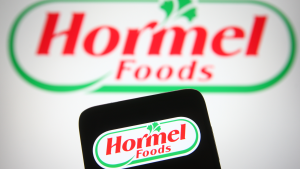This isn’t intended to be a contrarian article. In fact, it’s the opposite. When looking at stocks trading near 52-week lows, the question you have to ask is, why? If the reason for the stock’s slump is short-lived or has already passed, these stocks can offer investors an appealing opportunity in what may still be a volatile market.
That’s the case with the seven dividend stocks in this article. All of them have dropped sharply in the last 12 months. But each stock has fundamental reasons why the story should turn around in 2024 and beyond.
Pfizer (PFE)

The fact that Pfizer (NYSE:PFE) is trading near its 52-week low is unsurprising. The biotech company is reporting sharply lower revenue and earnings as the shine has come off its COVID-19 halo. But two things can be true at the same time. In the case of Pfizer, the other truth is the stock is fundamentally undervalued.
Analysts want Pfizer to show them, not tell them, how the company will replace its COVID-19 revenue. Pfizer took the first steps to do that in its recent earnings presentation.
The company had a record number of FDA approvals in 2023. It completed its acquisition of Seagen (NASDAQ:SGEN), which will double the company’s oncology portfolio, and it is forecasted to have eight blockbuster oncology drugs approved by 2030.
And it’s important to note that the company’s revenue, excluding its COVID products, was up 7%, which was in line with the company’s guidance of growth between 6% and 8%.
PFE stock is trading at just 12.3x forward earnings, which doesn’t factor in any of the company’s projected 24% earnings growth over the next 12 months. And even if this growth isn’t realized immediately, investors can still get a juicy dividend with a 6.10% dividend yield.
Philip Morris (PM)

At this time last year, you might have expected Philip Morris (NYSE:PM) to be one of 2023’s biggest winners. A quintessential “sin stock,” Philip Morris has the advantage of being able to sell its tobacco and smokeless tobacco products no matter what’s happening in the economy.
Sure enough, year-over-year revenue and earnings are up slightly. But PM stock has been trading in a defined range for the last two years. Maybe it’s because data have never confirmed the long-anticipated recession. And part of it is that interest in everything AI made dividend stocks less attractive.
But in 2024, Philip Morris looks very attractive at 14.5x forward earnings, which puts it at the low end of its projected 12-month earnings. And potentially lower interest rates could be the fuel that sends PFE stock past a level of resistance around $107. Coincidentally, or maybe not, analysts are raising their price targets for the stock.
Bristol-Myers Squibb (BMY)

Bristol-Myers Squibb (NYSE:BMY) stock is trading near five-year lows, has a forward P/E ratio of just 7x, and is one of the more attractive dividend stocks with a juicy dividend yield of 4.93%. However, this is a biotech that’s seen better days. BMY stock is down 33.9% in the last 12 months. Nevertheless, analysts continue to bid the stock higher. However, how you feel about BMY stock will depend on how you feel about the company’s key issues.
The primary concern is that the company’s flagship drug, Eliquis, will soon face biosimilar competition. And the company recently admitted that the anticipated replacements won’t be ready as soon as expected. However, Eliquis and Optivo delivered 7% and 8% revenue gains in the company’s most recent quarter, respectively.
Adding to concerns is that earnings, which are already projected to be in the low single-digit range over the next 12 months, will take another hit from the company’s acquisition of Mirati Therapeutics. The company expects the acquisition to be diluted by approximately 35 cents a share in non-GAAP earnings in 2024. However, the acquisition will diversify Bristol-Myers’ oncology portfolio, which is already very deep.
Newmont Mining (NEM)

In 2024, many investors are diversifying into other assets like gold and Bitcoin (BTC-USD). It’s probably not a bad idea with the size of our national debt and geopolitical concerns that continue to grow. However, many investors may not be comfortable owning precious metals. That makes Newmont Mining (NYSE:NEM) an attractive alternative.
Newmont is the world’s largest gold mining company by volume. NEM stock is down 31% in the past 12 months, but the principle of supply and demand works in the company’s favor.
On the demand side, central banks added 1,037 tons of gold to their reserves. And that was after buying a record amount in 2022.
There’s no reason to believe that demand will slow dramatically. That’s bullish for the spot price of gold and gold mining stocks. Analysts agree and give the stock a price target that would be 66% higher than the closing price on February 8, 2024. Increased earnings will be bullish for the company’s dividend, which currently has a 4.80% yield.
Hormel (HRL)

The economy has many seeming contradictions. One of them is the fact that consumer staples stocks have remained relatively unloved. Hormel Foods (NYSE:HRL) is a good example. The stock has been down over 30% in the last 12 months, and the culprit is lower earnings. Hormel has been affected by sticky inflation on its input costs. It’s also dealing with higher labor costs.
Still, the consumer price index continues to trend in the right direction. And with a little help from the Fed, HRL stock, which is trading at five-year lows, should be an attractive investment.
The current forward P/E of 18.77 assumes the low end of the company’s earnings guidance. If the company begins to execute its three-year plan to grow earnings, the stock is priced for a big rebound. And along the way, investors get a growing dividend from a Dividend King that has increased its dividend for 58 consecutive years.
Albemarle (ALB)

Heading into 2023, to make the case for Albemarle (NYSE:ALB), all you had to say was “lithium.” Today, you may have to say “but really, lithium” to make your case.
That’s because consumers are souring on electric vehicles. But the question is why? Saying they don’t “want” EVs is too simplistic. People didn’t like smaller cars until they did. The same could be said of many innovations.
EV adoption will require more EV infrastructure. This chicken-and-egg question is clearly being answered in favor of more efficient batteries, plentiful charging stations, or maybe both.
That’s a long way to say don’t give up on Albemarle yet. A fundamental change has occurred, and EVs aren’t going away. When demand for lithium rises, so will the price of lithium. And with that, Albemarle’s 5.4x forward earnings will look like a steal. That’s what analysts seem to think. Out of 30 analysts, 18 give ALB stock a “Strong Buy” rating.
And while the company may not have the most attractive dividend in terms of yield. However, Albemarle is a Dividend Aristocrat that has increased its dividend for 28 consecutive years.
Nutrien (NTR)
Agriculture stocks are expected to have a strong year in 2024. That would be music to the ears of Nutrien (NYSE:NTR) shareholders. The stock is down 36% in the last 12 months despite global fertilizer increasing by 3% after falling by 7% in 2022.
According to Rabobank, potash application is forecast to increase by 5% in 2024. As the world’s largest potash producer and third largest nitrogen fertilizer producer, Nutrien benefits from even modest demand increases.
The current forward P/E ratio for NTR stock suggests the stock is fairly valued. However, analysts seem to believe that the company’s intrinsic value is not being priced into the stock. The consensus price target of $68.39 is a 39% increase from the stock’s current price. And investors are getting one of the more attractive dividend stocks with a 4.22% yield.
On the date of publication, Chris Markoch did not have (either directly or indirectly) any positions in the securities mentioned in this article. The opinions expressed in this article are those of the writer, subject to the InvestorPlace.com Publishing Guidelines.
Chris Markoch is a freelance financial copywriter who has been covering the market for over five years. He has been writing for InvestorPlace since 2019.

